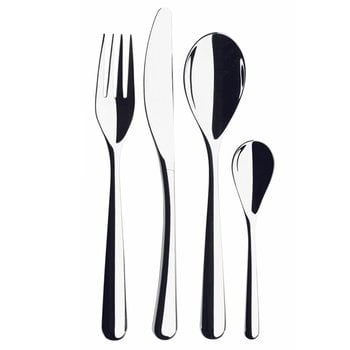Iittala's Piano cutlery range was designed by Italian architect Renzo Piano in 1998. The soft contours of the Piano cutlery feel pleasant in the hand, while their refined and streamlined shapes delight in both everyday and festive table settings, year after year, for decades to come. Piano cutlery is made of polished stainless steel.
Delivered in a gift box, this 16-piece cutlery set includes 4 dining forks, 4 dining knives, 4 dining spoons and 4 coffee spoons.


